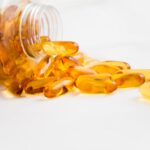Stream this Podcast episode:
Summary:
- Many people, including health professionals, recommend fish oil for Crohn’s / U.C. / IBD
- Learn what the research REALLY shows about fish oil and IBD
- A different and *better* way of thinking about omega-3s
Related Posts:
- Symptoms of Ulcerative Colitis vs Crohn’s Disease
- Ulcerative Colitis vs Crohn’s Disease: What You Need to Know (Plus One Treatment Tip!)
- Best Type of Fiber For IBD / Crohn’s / U.C. (Backed By Research)
- Is Fish Oil Good for Crohn’s / U.C. / IBD?
Full Article:
In this episode, we are going to be talking about the truth of whether fish oil is effective at reducing symptoms of IBD.
Fish oil is one of the most popular supplements nowadays, and it makes sense why.
It is essentially an anti-inflammatory fat that can help to lower inflammation in many different types of disease conditions.
The basic way that it works is that it, being an omega-3, competes with omega-6s to reduce and sometimes help “resolve” inflammation.
Omega-6s and omega-3 are very important when it comes to chronic inflammation, because they each produce their own unique “prostaglandins” that are heavily involved in the propagation of inflammation.
To give you an idea of how intimately omega-3s and omega-6 are tied in to inflammation, when you take an NSAID (ibuprofen, Motrin, aspirin, Advil, etc.), the only way that it works to reduce inflammation is by blocking the ability of these “omegas” to turn into prostaglandins (they do this by blocking what’s called the COX enzymes).
That’s it. That’s how they work.
Since we typically have MUCH more omega-6 “in us” than omega-3, shutting down this process for all omegas leads to a net reduction in inflammation.
Now, there are problems when it comes to using NSAIDs for gut inflammation, because they tend not to play well with the intestinal tract.
However, the most popular first-line treatment for IBD is mesalamine (brand names: Apriso, Asacol HD, Delzicol, Lialda, and Pentasa), which is actually a simple and close derivative of aspirin! (Look up the chemical structures on google images.)
Thus, in theory, fish oil should be a fantastic addition for IBD!
What the Research Really Shows
Many animal studies have shown very positive results with fish oil for IBD. We’ll get more into why this is the case soon.
However, when it came to real human clinical trials, the results were a bit different.
Let’s quickly list a summary of these trials now:
- A 2014 large Cochrane Systematic Review found that fish oil was largely ineffective at maintaining remission in Crohn’s Disease. 37% of patients in the fish oil group relapsed at 12 months compared to 42% of placebo patients, which was statistically insignificant.(1)
- A 1996 study also showed that 5g/day of concentrated, high quality fish oil was not able to prolong remission in Crohn’s Disease patients.(2)
- A 2005 study in kids with Crohn’s Disease (average age was 10 years old) showed that 3g per day of fish oil in “gastro-resistant capsules” as an add-on to mesalazine was able to significantly prolong the time the kids stayed in remission over two years compared to mesalazine alone.(3)
- A 2011 Systematic Review and Meta-Analysis found no clinical benefit for fish oil for maintaining remission in both Crohn’s and U.C.(4)
Thus, outside of kids, fish oil got pretty poor, or no, results.
However, There is Hope!
Yet, there were two studies done that makes a unique distinction that should make us slightly shift our focus…
- A diet with an omega 6:3 ratio of 2 (i.e. relatively high in omega 3s, lower in omega 6 compared to usual diets) was able to reduce CRP (a marker of inflammation), allow Crohn’s patients to wean off of an elemental diet without a flair up, and significantly prolong the time the patients were able to stay in remission.(5)
- In a rodent study, researchers induced colitis in rats by giving them a chemical called “DSS”. DSS is one of the most common research chemicals to cause colitis in rats. They gave saline, or placebo, to another group of rats, which was the control group.(6)
- They broke the DSS / colitis rats into 4 different groups. The only difference was the ratio of omega-6s / omega-3s that each group was given. The group with the most omega-6 and least omega-3s had a ratio of 215 (called the DSS-215 group), whereas the group with the least omega-6s and the most omega-3s had a ratio of 2 (called the DSS-2 group).
- After some time, the researchers took out the colon of the rats to see how inflamed and damaged it was.
- As you can see below, the omega-6/3 ratio made a HUGE difference.

***As you can see above, the lower the 6/3 ratio, the better the colon looked. The DSS-215 group (high in omega-6) had a big, very inflamed red colon (that was also a lot shorter). The lowest 6/3 ratio (bottom image, low in omega-6, high in omega-3) looked nearly completely normal!***
What Does This Mean?
From these two studies, we can recognize a pattern.
It is likely that it is the ratio of omega-6 / omega-3 that matters, not just popping a couple grams of fish oil pills.
Most people are consuming dozens of omega-6s per day, usually unknowingly. (They are in EVERYTHING nowadays).
So, sprinkling a few grams of omega-3s on top of that really isn’t going to change the ratio much.
(Possibly why fish oil worked for the kids was that they didn’t have as much omega-6 “in them” compared to the adults!)
You want to do whatever you can to lower your omega-6 intake AND increase your omega-3 intake.
THIS is where the magic happens.
Omega-6s come mainly from vegetable oils, like soybean oil, corn oil, safflower oil, sunflower oil, etc.
They are used in nearly every restaurant to cook with (since they are very cheap), in most packaged and processed foods, in most snacks, in many boxed foods, in TV dinners, pizzas, etc.
However, this doesn’t mean you have to cut out all snacks or anything like that.
You just have to know what to look for and choose better options!
Free Gift: “3 Natural Strategies for IBD”!
If you would like to know exactly how to choose foods that are low in omega-6s, and get even more omega-3s, you’ll want to grab my free “3 Natural Strategies for IBD” mini-online course!
Besides showing you step by step how to make these choices about omega-6s / 3s easily, I also teach you:
- 1 POWERFUL supplement that has multiple clinical trials showing effectiveness for IBD
- 1 Easy way to change your diet that can “move the needle” with IBD symptoms
- 1 Simply way to decrease inflammation in IBD
The entire mini-course is based on research and evidence, so you can have full trust in the info you’re getting.
It is entirely free and something you don’t want to miss out on.
It will give you clarity so you no longer have to be confused at which foods to eat and which to avoid.
Most importantly, it is NOT a “limiting” or “restrictive” diet plan.
You can grab it for FREE here.
Warmly,
Dr. Sean DC
References:
1. Lev-Tzion R, Griffiths AM, Leder O, Turner D. Omega 3 fatty acids (fish oil) for maintenance of remission in Crohn’s disease. Cochrane Database Syst Rev. 2014 Feb 28;(2):CD006320. doi: 10.1002/14651858.CD006320.pub4. PMID: 24585498.
2. Lorenz-Meyer H, Bauer P, Nicolay C, Schulz B, Purrmann J, Fleig WE, Scheurlen C, Koop I, Pudel V, Carr L. Omega-3 fatty acids and low carbohydrate diet for maintenance of remission in Crohn’s disease. A randomized controlled multicenter trial. Study Group Members (German Crohn’s Disease Study Group). Scand J Gastroenterol. 1996 Aug;31(8):778-85. doi: 10.3109/00365529609010352. PMID: 8858747.
3. Romano C, Cucchiara S, Barabino A, Annese V, Sferlazzas C. Usefulness of omega-3 fatty acid supplementation in addition to mesalazine in maintaining remission in pediatric Crohn’s disease: a double-blind, randomized, placebo-controlled study. World J Gastroenterol. 2005;11(45):7118-7121. doi:10.3748/wjg.v11.i45.7118
4. Turner D, Shah PS, Steinhart AH, Zlotkin S, Griffiths AM. Maintenance of remission in inflammatory bowel disease using omega-3 fatty acids (fish oil): a systematic review and meta-analyses. Inflamm Bowel Dis. 2011 Jan;17(1):336-45. doi: 10.1002/ibd.21374. PMID: 20564531.
5. 37. Tsujikawa T, Satoh J, Uda K, Ihara T, Okamoto T, Araki Y, Sasaki M, Fujiyama Y, Bamba T. Clinical importance of n-3 fatty acid-rich diet and nutritional education for the maintenance of remission in Crohn’s disease. J Gastroenterol. 2000;35(2):99-104. doi: 10.1007/s005350050021. PMID: 10680664.
6. Tyagi, Anupama & Putcha, Uday & Reddy, Suryam & Santosh, Vadakattu & Mohammed, Saazida & Ehtesham, Nasreen & Ibrahim, Ahamed. (2012). Attenuation of colonic inflammation by partial replacement of dietary linoleic acid with α-linolenic acid in a rat model of inflammatory bowel disease. The British journal of nutrition. 108. 1-11. 10.1017/S0007114511007197.






